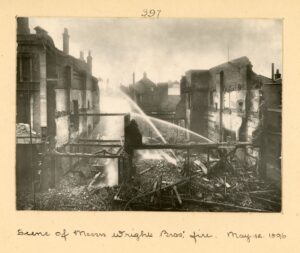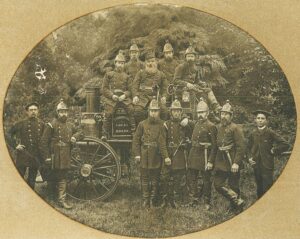Preparing for the worst – Help! What if there is a fire in the archive?
Archive documents are one of a kind and irreplaceable. They are priceless. If you have a handwritten diary created by someone living through the First World War, full of their thoughts, fears, loves, hates, and even doodles on the side of the page, there is no way to recreate it if it gets destroyed.
In the archive world, once something is gone, it’s gone forever.
Here in the Richmond Local Studies Library and Archive this is something we think about a lot. We look after thousands of unique, irreplaceable archive documents, and we look after them so they can be read by the public. Our archives form an invaluable historic record of life in Richmond upon Thames.
It’s a big responsibility to look after this historic record and make sure that everything is kept in good condition and readable, for people now and for the generations of people to come. But it isn’t always easy when most of your documents are on paper, because paper is inherently fragile.

With paper you have the day-to-day cares: making sure the documents are kept in good conditions, not so hot that the paper turns brown and crumbly, and not so wet that you get mould growing; and making sure you keep away paper-eating pests like rodents and insects.
That’s all fine and good, but sometimes you can keep your archives in the best conditions possible, and then suddenly disaster strikes. Fires, floods, gas explosions: catastrophes can happen, and when you are looking after priceless archives, you have to be prepared for these sorts of events. This photograph of the Wright Bros. department store on George Street, Richmond, from 1896, painfully shows the destruction that can occur.
In Local Studies we are fine-tuning our disaster plans. Say the worst were to happen – then what? Our disaster plan means that we know how to act quickly to save our collections.

We recently had a visit from the London Fire Brigade (though their uniforms were much more modern than those worn by the Teddington Local Board Fire Brigade in this photograph from the 1880s). The London Fire Brigade looked over our building (The Old Town Hall in Richmond) and our collections to familiarise themselves. We also sent them plans of the building to keep on file so they can be prepared when they arrive in an emergency. And here in Local Studies we have given them a list of archive documents that should be prioritised for rescue.
There may be times where the damage to the building is so great that the Fire Brigade can’t reach the archives to save them, and of course the Fire Brigade will always make sure that they save lives first. But it’s really comforting to know that once everyone is safe out of the building, if it is still safe for the Fire Brigade to re-enter, they will do everything they can to rescue our precious archives.
As an Archivist, imagining what would happen to the archives if a disaster occurred can be heart-stoppingly terrible. It’s awful to think of the entire historic record of Richmond upon Thames going up in smoke. But even though it’s awful to think of, it’s really important to have these disaster plans in place so we can make sure that even if the worst did happen, the archive will be protected as much as possible.
Would you like to find out about our unique, one-of-a-kind archive documents and see them for yourself? You are welcome to visit the Local Studies Library and Archive to do so. Visit the Local Studies website for opening times and further information.
Janine Stanford, Archivist

Leave a Reply